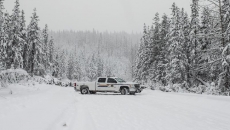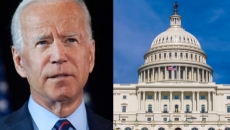OTTAWA - Almost one in four Canadian respondents to a new online survey said they had been infected with COVID-19, while about three in four had not.
As the country grapples with its sixth wave of the COVID-19 pandemic and less data is shared with the public, the poll by Leger and the Association for Canadian Studies offers a picture of how many people have been infected.
Christian Bourque, Leger executive vice-president, said it was notable that the rate of reported infection sat higher than what the official data has suggested.
The online survey of 1,538 Canadians, conducted April 8 to 10, cannot be assigned a margin of error because internet-based polls are not considered random samples.
Thirty per cent of respondents aged 18 to 34 said they had been infected with COVID-19, while 12 per cent of those 55 years and older had contracted the disease.
"What was really striking was the difference when it comes to age," Bourque said.
"It seems to match the patterns that we're seeing, that the more social you are — going out to restaurants, bars, and concerts — makes you a little bit more vulnerable to getting the disease."
Vaccination status also played a role, with 38 per cent of unvaccinated respondents saying they had been infected compared to 20 per cent of their vaccinated counterparts.
Almost three in five respondents who had COVID-19 say they had mild symptoms, while 14 per cent said they had severe symptoms that didn't prevent them from doing daily activities.
One in five of those infected with the virus said they had severe symptoms that kept them in bed.
Asked if they were afraid of contracting COVID-19, respondents were evenly split.
Forty-four per cent said they feared getting the virus while 45 per cent said they weren't fearful.
Despite that, more than half of respondents said they think the worst of the pandemic is behind them, representing about a 30-point increase since Canadians were asked in January.
"In a way people are telling us we're over the hump, things are improving," Bourque said, adding that "COVID is not over."
Another poll conducted in March looked at the experiences of North Americans with long COVID-19 symptoms, one-quarter of whom were Canadian.
Of those who said they experienced long-term effects from COVID-19, more than half said they suffered from fatigue, and almost half from muscle and joint pain.
Jack Jedwab, president of the Association for Canadian Studies, said these findings brush up against the perception of the latest COVID-19 strain being similar to the flu or common cold.
“That's not what the poll is suggesting in terms of longer-term symptoms,” said Jedwab.
Being an internet-based poll, the online survey of 1,981 North Americans cannot be assigned a margin of error.
Respondents aged 30 to 34 years old were most likely to report long-term symptoms of COVID-19.
Jedwab said he thinks it’s important for people to be aware of the risk for long COVID-19 and the symptoms, “so that we can be better equipped to deal with some of the things that might arise.”






